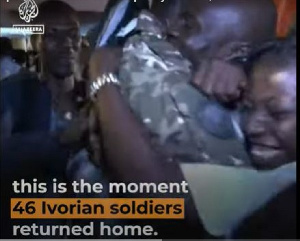Forty-six Ivorian soldiers accused by Mali of being mercenaries have returned home after six months in captivity.
The troops arrived at Ivory Coast’s Abidjan airport late on Saturday, a day after receiving a pardon from Mali’s military ruler.
Their arrest in the Malian capital of Bamako in July of last year triggered a bitter diplomatic fight between the neighboring countries.
Mali accused them of being mercenaries, while Ivory Coast said they were flown in to provide routine backup security for the German contingent of a United Nations peacekeeping mission.
Emerging from their plane home on Saturday, each soldier held a small Ivorian flag and smiled as they shook hands with Ivorian President Alassane Ouattara, who was waiting to greet them at the airport.
“Now that this crisis is behind us, we can resume normal relations with the brother country of Mali,” Ouattara said once they were all on Ivorian soil.
A spokesperson for the soldiers thanked Ouattara, and “the Ivorian people for their support and active solidarity”.
“We are happy and relieved to return to the motherland,” he said.
Their release comes days after a court in Bamako sentenced them to 20 years in prison on charges of conspiring against the Malian government and seeking to undermine state security. Three women, who had been among the original 49 arrested at the airport and released earlier, received death sentences in absentia.
The sentences came ahead of a January 1 deadline set by leaders from the Economic Community of West African States (ECOWAS) for Mali to release the soldiers or face sanctions.
But on Friday, Mali’s military leader Assimi Goita pardoned all 49.
The Malian government cited a memorandum of understanding that the two countries had signed “on the promotion of peace and the strengthening of relations of friendship, brotherhood and good neighborliness between the Republic of Mali and the Republic of Ivory Coast”.
It also thanked Togo’s President Faure Gnassingbe, who had mediated the dispute.
Relations between Mali and its West African neighbors have been strained since Goita led a coup against elected President Ibrahim Boubacar Keita in August 2020. The country’s new rulers initially promised elections by February of last year but then announced a four-year delay, weeks ahead of the vote.
The move prompted stiff ECOWAS sanctions on Mali that crippled the country’s economy.
The punitive measures were lifted in July when Bamako proposed a 24-month transition to democracy and promised a new electoral law.
 Home Of Ghana News Ghana News, Entertainment And More
Home Of Ghana News Ghana News, Entertainment And More





